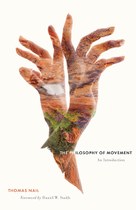 Thomas Nail, The Philosophy of Movement. An Introduction, University of Minnesota Press, 2024
Thomas Nail, The Philosophy of Movement. An Introduction, University of Minnesota Press, 2024
Foreword by Daniel W. Smith
Why are city dwellers worldwide walking on average ten percent faster than they were a decade ago? Why are newcomer immigrant groups so often maligned when migration has always constituted civilization? To analyze and understand the depth of the reasons, Thomas Nail suggests that it serves us well to turn to a philosophy of movement. Synthesizing and extending many years of his influential work, The Philosophy of Movement is a comprehensive argument for how motion is the primary force in human and natural history.
Nail critiques the bias toward stasis at the core of Western thought, asking what a philosophy that began with the primacy of movement would look like. Interrogating the consequences of movement throughout history and in daily life in the twenty-first century, he draws connections and traces patterns between scales of reality, periods of history, and fields of knowledge. In our age of rapid movements shaped by accelerating climate change and ensuing mass global migration, as well as ubiquitous digital media, Nail provides a contemporary philosophy that helps us understand how we got here and how to grapple with these interlocking challenges.
With a foreword by philosopher Daniel W. Smith, The Philosophy of Movement: An Introduction is a must-read for scholars and students not only of philosophy but also history, anthropology, science and technology studies, mobility studies, and other fields across the humanities and social sciences.
Thomas Nail is distinguished scholar and professor of philosophy at the University of Denver. He is author of Matter and Motion: A Brief History of Kinetic Materialism; Lucretius III: A History of Motion; Theory of the Object; and Being and Motion.
Daniel W. Smith is professor of philosophy at Purdue University. He has translated, from French, books by Gilles Deleuze, Pierre Klossowski, Isabelle Stengers, and Michel Serres.
